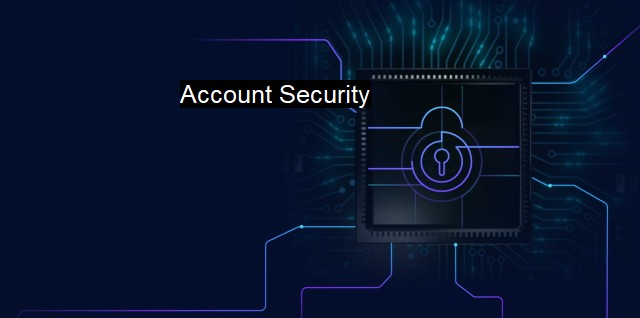What is Account Security?
Maximizing the Importance of Account Security in the Age of Cyber Threats: Safeguarding Your Online Presence
As the world becomes increasingly reliant on technology, online account security has become extremely important. The advancement of technology has not only provided users with greater convenience, but it has also created new risks in the realm of cybersecurity. Cybercriminals are always looking for ways to access sensitive information, and without appropriate security measures in place, they can do so with relative ease.Account security involves the implementation of measures designed to safeguard online accounts from unauthorized access. These measures include but are not limited to: usernames and passwords, multifactor authentication, biometrics, and account activity monitoring.
One of the most common security measures used to safeguard online accounts is the use of usernames and passwords. Users are typically required to create a username and password when signing up for an online account. A strong password is essential in ensuring that unauthorized individuals do not gain access to your account. A weak password can easily be compromised, and can lead to serious security breaches.
Multifactor authentication is another security measure employed to safeguard online accounts. It involves the use of two or more authentication factors, which could include not only usernames and passwords but also other methods such as fingerprints, face recognition, or a one-time token generated for a specific session. This makes hacking significantly more difficult since a potential attacker would need access to more than just the password to gain entry.
A more advanced account security method that is becoming increasingly popular is the use of biometrics. The use of biometric authentication involves verifying the user's unique physical characteristics such as fingerprints, facial features, and iris patterns. Biometric authentication is an additional layer of security used to verify the user's identity, making it significantly harder for unauthorized individuals to gain access.
Another security measure used is account activity monitoring. It allows online service providers to detect and prevent unauthorized access by identifying and monitoring unusual or suspicious account activity. This enables the service provider to alert the user early and take remedial actions to safeguard the account.
To maintain even greater security, users can also install antivirus and anti-malware software. This software is designed to scan the user's system or device, being vigilant against any known threats to block intrusion upon the system and erase potentially dangerous files or programs.
Without cybersecurity and antivirus measures in place, online accounts and devices can easily become vulnerable to a wide range of exploitative tactics that may be malicious in nature. Cybercriminals may use phishing attacks - sending an email asking the customer to provide personal details such as username, password or card details to steal information.
Antivirus and cybersecurity software will identify and remove malware, spyware, and viruses. They can also scan emails, website forms, and malware and search for known programmed threats as well as capacity to bring unknown automated threats under control. They reduce the risk that one's inbox becomes contagious with data so malevolent that all the data out of an account is void.
While no security measure is foolproof, by utilizing the methods outlined herein, individuals and organizations can take active preventative measures to reduce the potential to become a prime target for motivated hackers. Good password selection practices tend to be towards phrases recognized by people close: since, truly skilled hackers programs scan for cross-checked phoneme expression since such "traditional uniqueness," has inherited languages worldwide.
online account security is of great importance. This includes the deployment of authorization measures like usernames, passwords, multifactor authentication, biometrics, and active monitoring of account activities, as well as the installation of virus-scanning and cybersecurity software. While no security measure is absolute, preventative measures have been proven to significantly reduce the likelihood of threats presented by dangerous cybercriminals. using appropriate security measures protects sensitive information that can possibly cause irrevocable infamy and financial risk to individuals and organizations alike, regardless of scale.

Account Security FAQs
What is account security?
Account security refers to the measures taken to protect your digital identity and sensitive information associated with your accounts from unauthorized access and misuse.Why is account security important?
Account security is crucial because cybercriminals are always looking for ways to gain access to accounts and steal personal information or commit fraud. Good account security practices help to prevent unauthorized access and keep your information safe.What are some ways to improve account security?
Some ways to improve account security include using strong and unique passwords, enabling two-factor authentication, keeping your software and antivirus up-to-date, avoiding public Wi-Fi for sensitive transactions, and being cautious of phishing scams.What should I do if I suspect my account has been compromised?
If you suspect your account has been compromised, you should immediately change your password and enable two-factor authentication. Contact your bank or credit card company if financial accounts are involved, and monitor your accounts closely for any suspicious activity. You may also want to consider contacting a cybersecurity professional for assistance. External Resources
| | A | | | B | | | C | | | D | | | E | | | F | | | G | | | H | | | I | | | J | | | K | | | L | | | M | |
| | N | | | O | | | P | | | Q | | | R | | | S | | | T | | | U | | | V | | | W | | | X | | | Y | | | Z | |
| | 1 | | | 2 | | | 3 | | | 4 | | | 7 | | | 8 | | |||||||